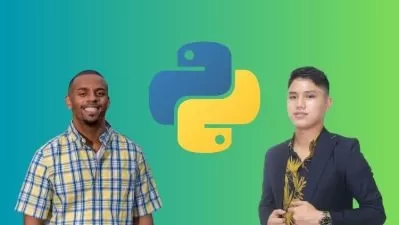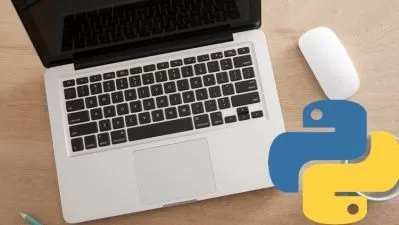Learn Python for beginners with Projects 2024
MMZ Academy
2:47:44
Description
Learn Python step by step and with hands on Projects
What You'll Learn?
- Learn Python From the scratch
- Understanding Python Essentials and Concepts
- Hands On projects
- Practice Step By Step
Who is this for?
What You Need to Know?
More details
DescriptionPython is a general-purpose interpreted, interactive, object-oriented, and high-level programming language. It was created by Guido van Rossum during 1985- 1990. Like Perl, Python source code is also available under the GNU General Public License (GPL). This tutorial gives enough understanding on Python programming language
Why to Learn Python?
Python is a high-level, interpreted, interactive and object-oriented scripting language. Python is designed to be highly readable. It uses English keywords frequently where as other languages use punctuation, and it has fewer syntactical constructions than other languages
Python is a MUST for students and working professionals to become a great Software Engineer specially when they are working in Web Development Domain. I will list down some of the key advantages of learning Python:
Python is Interpreted − Python is processed at runtime by the interpreter. You do not need to compile your program before executing it. This is similar to PERL and PHP
Python is Interactive − You can actually sit at a Python prompt and interact with the interpreter directly to write your programs
Python is Object-Oriented − Python supports Object-Oriented style or technique of programming that encapsulates code within objects
Python is a Beginner's Language − Python is a great language for the beginner-level programmers and supports the development of a wide range of applications from simple text processing to WWW browsers to games
Characteristics of Python
Following are important characteristics of Python Programming −
It supports functional and structured programming methods as well as OOP
It can be used as a scripting language or can be compiled to byte-code for building large applications
It provides very high-level dynamic data types and supports dynamic type checking
It supports automatic garbage collection
It can be easily integrated with C, C++, COM, ActiveX, CORBA, and Java
Python is one of the most widely used language over the web. I'm going to list few of them here:
Easy-to-learn − Python has few keywords, simple structure, and a clearly defined syntax. This allows the student to pick up the language quickly
Easy-to-read − Python code is more clearly defined and visible to the eyes
Easy-to-maintain − Python's source code is fairly easy-to-maintain
A broad standard library − Python's bulk of the library is very portable and cross-platform compatible on UNIX, Windows, and Macintosh
Interactive Mode − Python has support for an interactive mode which allows interactive testing and debugging of snippets of code
Portable − Python can run on a wide variety of hardware platforms and has the same interface on all platforms
Extendable − You can add low-level modules to the Python interpreter. These modules enable programmers to add to or customize their tools to be more efficient
Databases − Python provides interfaces to all major commercial databases
GUI Programming − Python supports GUI applications that can be created and ported to many system calls, libraries and windows systems, such as Windows MFC, Macintosh, and the X Window system of Unix
Scalable − Python provides a better structure and support for large programs than shell scripting
Who this course is for:
- DevOps Engineers
- DevSecOps Engineers
- Developers
- System Administrator
- IT Engineers
Python is a general-purpose interpreted, interactive, object-oriented, and high-level programming language. It was created by Guido van Rossum during 1985- 1990. Like Perl, Python source code is also available under the GNU General Public License (GPL). This tutorial gives enough understanding on Python programming language
Why to Learn Python?
Python is a high-level, interpreted, interactive and object-oriented scripting language. Python is designed to be highly readable. It uses English keywords frequently where as other languages use punctuation, and it has fewer syntactical constructions than other languages
Python is a MUST for students and working professionals to become a great Software Engineer specially when they are working in Web Development Domain. I will list down some of the key advantages of learning Python:
Python is Interpreted − Python is processed at runtime by the interpreter. You do not need to compile your program before executing it. This is similar to PERL and PHP
Python is Interactive − You can actually sit at a Python prompt and interact with the interpreter directly to write your programs
Python is Object-Oriented − Python supports Object-Oriented style or technique of programming that encapsulates code within objects
Python is a Beginner's Language − Python is a great language for the beginner-level programmers and supports the development of a wide range of applications from simple text processing to WWW browsers to games
Characteristics of Python
Following are important characteristics of Python Programming −
It supports functional and structured programming methods as well as OOP
It can be used as a scripting language or can be compiled to byte-code for building large applications
It provides very high-level dynamic data types and supports dynamic type checking
It supports automatic garbage collection
It can be easily integrated with C, C++, COM, ActiveX, CORBA, and Java
Python is one of the most widely used language over the web. I'm going to list few of them here:
Easy-to-learn − Python has few keywords, simple structure, and a clearly defined syntax. This allows the student to pick up the language quickly
Easy-to-read − Python code is more clearly defined and visible to the eyes
Easy-to-maintain − Python's source code is fairly easy-to-maintain
A broad standard library − Python's bulk of the library is very portable and cross-platform compatible on UNIX, Windows, and Macintosh
Interactive Mode − Python has support for an interactive mode which allows interactive testing and debugging of snippets of code
Portable − Python can run on a wide variety of hardware platforms and has the same interface on all platforms
Extendable − You can add low-level modules to the Python interpreter. These modules enable programmers to add to or customize their tools to be more efficient
Databases − Python provides interfaces to all major commercial databases
GUI Programming − Python supports GUI applications that can be created and ported to many system calls, libraries and windows systems, such as Windows MFC, Macintosh, and the X Window system of Unix
Scalable − Python provides a better structure and support for large programs than shell scripting
Who this course is for:
- DevOps Engineers
- DevSecOps Engineers
- Developers
- System Administrator
- IT Engineers
User Reviews
Rating
MMZ Academy
Instructor's Courses
Udemy
View courses Udemy- language english
- Training sessions 35
- duration 2:47:44
- English subtitles has
- Release Date 2024/03/13










